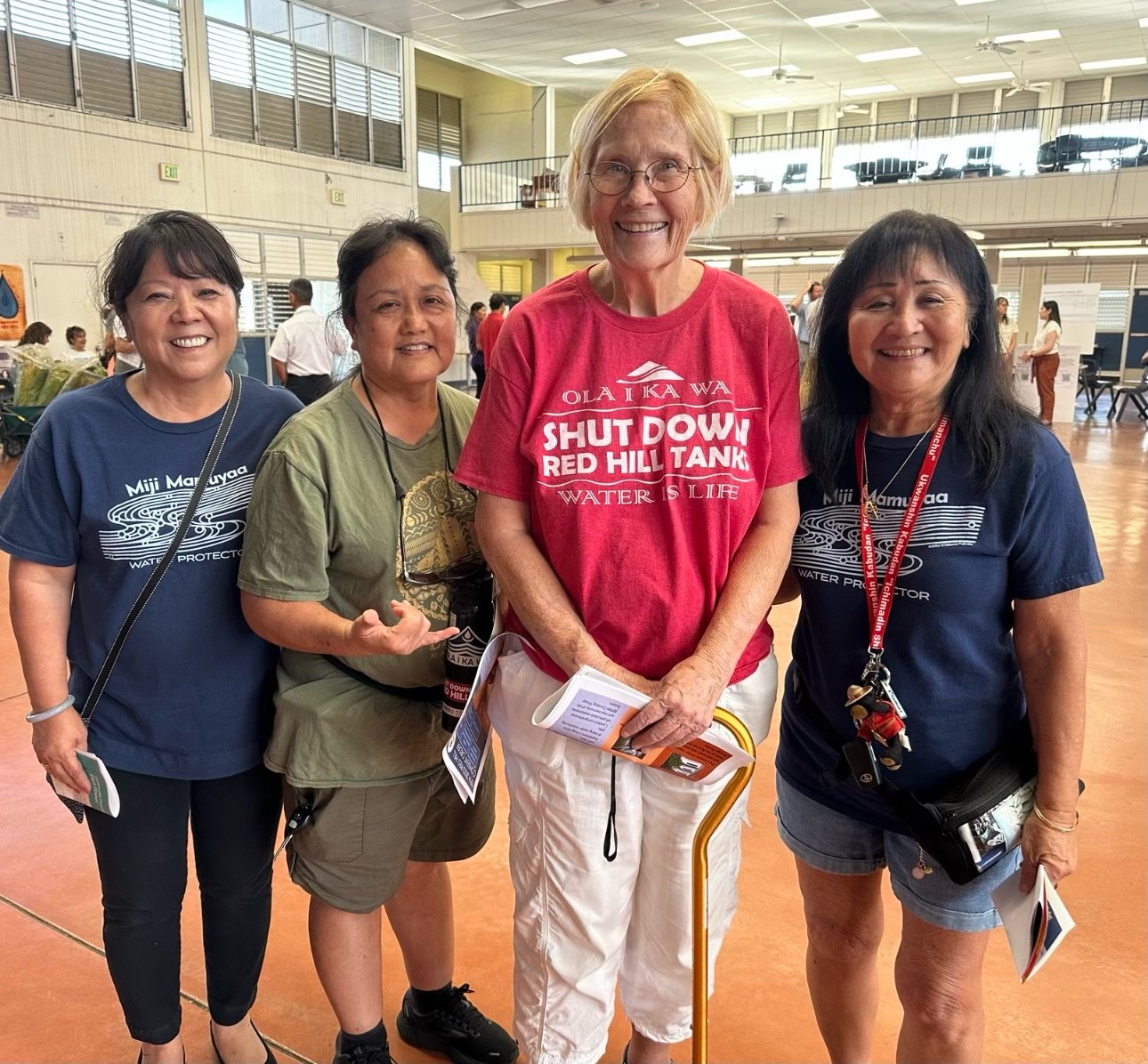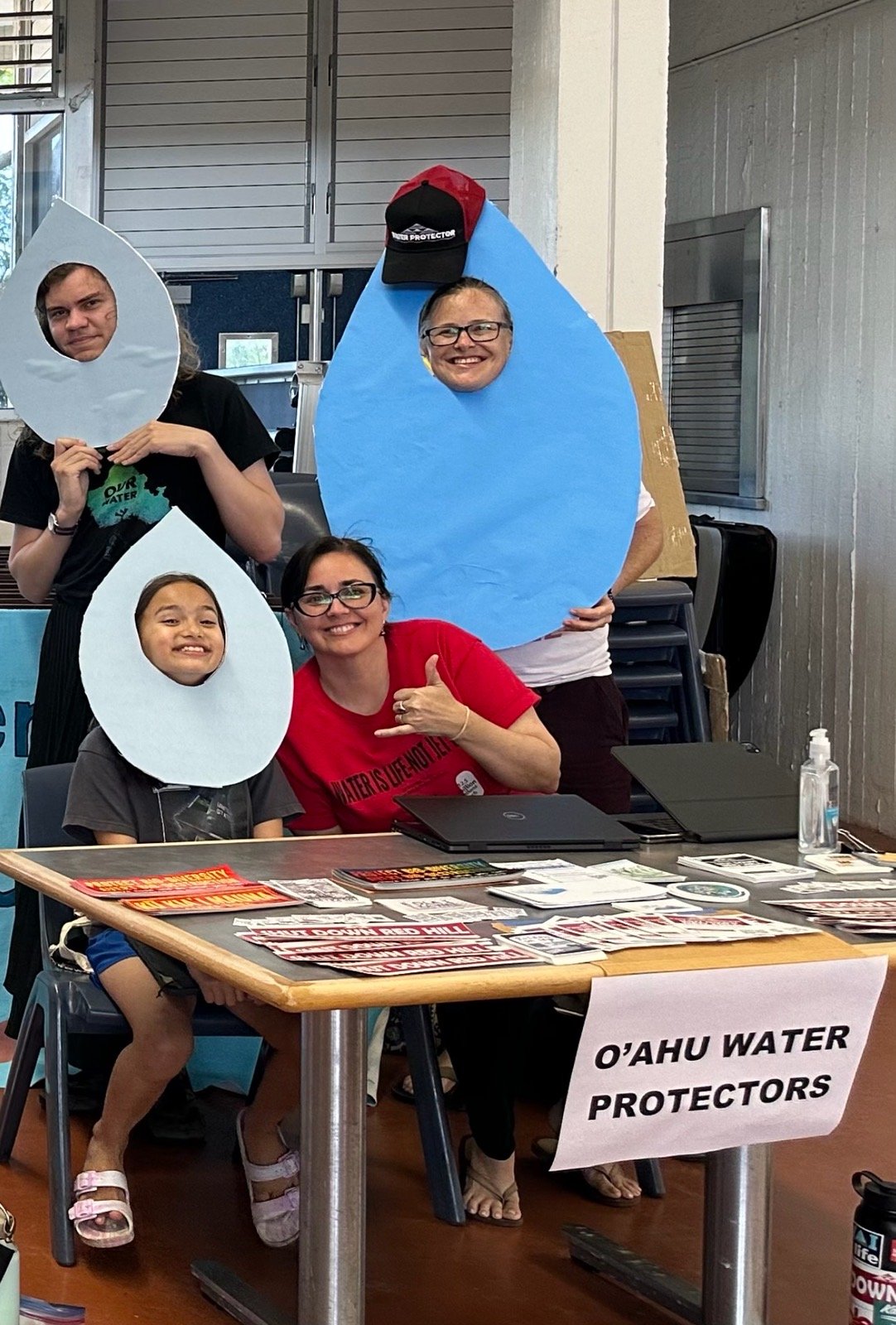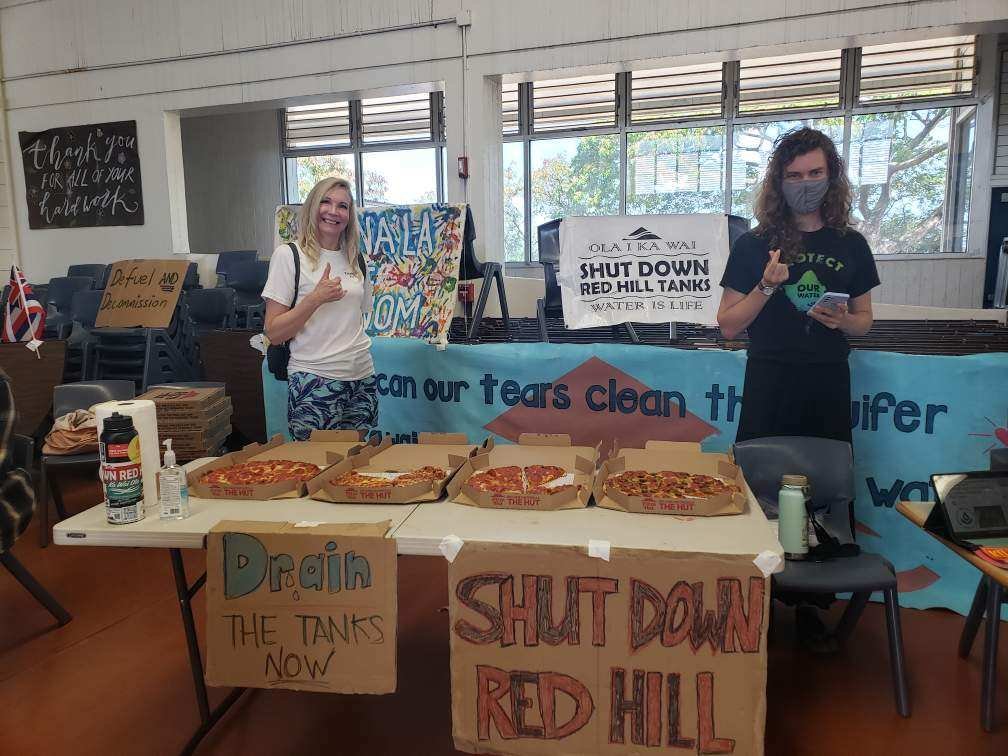Red Hill update: Summer happenings
By Liz Wiggans, ʻImiloa Borland, Rosalie Luo, Rebekah Garrison, and Kirsten Kagimoto | Reading time: 11 minutes
June flew by and was packed with several agency-hosted meetings around Red Hill defueling and much more. Read on for updates on the meetings, hearings, and what’s on the horizon.
Mahalo nui
We’d like to recognize and extend our deepest mahalo to the Omidyar ʻOhana for their generous donation to our Red Hill work!! Mahalo nunui for your continued support and commitment to helping secure Oʻahu’s drinking water future.
We also extend a heartfelt thank you to everyone that donated lāʻī (ti leaf) ahead of the events in early June! Together with our friends at OHA, Earthjustice, Shut Down Red Hill Coalition, Wisdom Circles Oceania, 15 Craigside, and others, we are aiming to weave a 250 foot ti leaf lei to demonstrate the massive size of the Red Hill fuel tanks. Through these efforts, we stand in solidarity as a community noting that for nearly 250 years the US military has been a central figure in helping eradicate Native Hawaiian sovereignty. As such, we are still seeking donations of lāʻī to continue weaving together lei at this year’s Lā Hoʻihoʻi Ea Honolulu on Sunday, July 30th, at Thomas Square. Please join us as we discuss what genuine security and women’s safety looks like for our community. For the most up-to-date information regarding online and in-person events for Lā Hoʻihoʻi Ea, follow them on Facebook and Instagram. If you would like to donate please contact Sharde at sharde.freitas@sierraclub.org for Hawaiʻi Island donations, Becka at garrisonrs@gmail.com for Oʻahu donations, and hawaii.chapter@sierraclub.org for all other islands.
Department of Health Open House
The Hawaiʻi Department of Health hosted a Red Hill Open House on Monday, June 5 at Moanalua High School to provide updates on the preparations and progress of defueling the Red Hill tanks ahead of the Fuel Tank Advisory Committee Meeting on Tuesday, June 6. For the first time ever, the Sierra Club of Hawaiʻi and the Oʻahu Water Protectors were invited to host booths inside an agency’s open house. Like most other recent “community engagement” meetings, the event was a science fair type format with booths from the US Navy, Joint Task Force-Red Hill, EPA, Defense Health Agency, and others. We, however, had music, swag, art for keiki, petitions to sign, a rolling Powerpoint presentation, educational materials, free pizza, and, perhaps most importantly, alternative messaging and talking points to share with community outside of what has become egregiously normalized pat-on-the-back praise for a military slow to do the basics of their job.
Fuel Tank Advisory Committee meeting
The following day, June 6, the Hawaiʻi Department of Health hosted the first Fuel Tank Advisory Committee meeting of 2023. In a possible effort to meet community needs, the health department hosted the meeting at Moanalua High School, rather than the state capitol building. However, the meeting was still held during business hours, 1-5pm, and the public comment section of the agenda was cut short after the Navy and other agencies were provided hours of speaking time. We hope that future Fuel Tank Advisory Committee meetings are made more available to working families and provide meaningful time for concerned residents and water drinkers to ask questions and have their voices heard. Mahalo nui to the water advocates that joined the meeting in-person or by Zoom, we greatly appreciate your commitment and sacrifices in our collective efforts to protect our drinking water today and for generations.
Red Hill Consent Order
On June 3, the Environmental Protection Agency (EPA) issued a Consent Order and Statement of Work for the Navy and Defense Logistics Agency (DLA), concerning the closure of the Red Hill Fuel Storage Facility. The document outlines a vague timeline, procedures, and checkpoints to assist the Navy in complying with the defueling and permanent closure of the storage tanks, surge tanks, and pipelines. The EPA’s requirements supplement those of the Department of Health, and the Navy is obligated to adhere to both sets of guidelines.
The Navy must provide the EPA with weekly oral updates and monthly written progress reports, detailing the status of each checkpoint, issues encountered, deviations from plans and reasons for the deviation, sampling results, as well as descriptions of public relations. Additionally, the Navy is expected to meet with the Community Representation Initiative (CRI) eight times a year. The CRI consists of 10 community-selected members who engage with the Navy to discuss the defueling progress, protection of the water supply, and permanent closure of the facility. Prior to quarterly CRI meetings, the Navy must post updates on their website and social media platforms in languages requested by CRI to facilitate public comments and questions. To learn more about the CRI, please visit this link and save the date for the EPA Scoping Meeting on the Community Representation Initiative (CRI) on July 27 at Aliamanu Middle School, 3271 Salt Lake Blvd, Honolulu, HI 96818 from 5-7pm.
Although the Consent Order includes measures for protecting water during defueling, it does not address the remediation or decontamination of existing fuel, Simple Green, AFFF and PFAs in the water supply. The EPA did not include meaningful penalties for the Navy or DLA’s deviations from the Statement of Work.
Red Hill Defueling Environmental Assessment
On June 16, the Navy released an Environmental Assessment that examines the fuel relocation plans from Red Hill to various locations. The proposed locations are Sasebo, Japan; Subic Bay, Philippines; Singapore; Darwin, Australia; Manchester, Washington; Vancouver, Washington; Selby, California; Point Loma, California, and West Oʻahu. It remains uncertain whether the communities in these locations have been informed about the impending fuel relocations.
The Assessment evaluated three alternatives for fuel removal. The first option explored using the Red Hill fuel for base activities instead of the current supply, taking an estimated 10-12 months. The second option involved relocating the fuel to the nine aforementioned locations, taking an estimated 7- 8 months. The third alternative considered the environmental impacts of commercially selling the fuel to yet unknown buyers. Each alternative incorporated best management practices to minimize the risk of spills during fuel transportation. The Assessment also analyzed significant impacts on air, water, and biotic factors, including endangered species. The Assessment concluded that the impacts of fuel relocation under the second alternative would have “less than significant effects” on air and water quality, and would have no effect on endangered species, fisheries, and their habitat. Of particular concern, specifically because the Navy continues to claim a commitment to “remove every last drop of fuel in the Red Hill tanks”, the Assessment did not address the removal of residual fuel “sludge” or the potential impacts on communities adjacent to the proposed relocation sites.
You can read the Sierra Club of Hawaiʻi’s comments on the Environmental Assessment here.
Depose and oppose Admiral Paparo
The families that were poisoned by the November 2021 Red Hill leak that are now suing the Navy, were hoping to depose four-star admiral Samuel Paparo, who was leading the US Pacific Fleet when the Red Hill crisis started. The Department of Justice opposed his deposition, stating that he was too high ranking to be questioned in this case. Unfortunately, the federal judge agreed in late June.
A handful of fellow water drinkers gathered outside the courtroom before and after the hearing to demonstrate their support for the impacted families and the deposition of Admiral Paparo.
Earlier in June, Defense Secretary Lloyd Austin nominated Paparo to be the next chief of naval operations—the highest ranking Navy official. His nomination is subject to approval by President Biden and the US Senate Committee on Armed Services. Given his recent track record and lackluster response to the Red Hill crisis, the Sierra Club of Hawaiʻi and allies, in solidarity with the impacted families, are in great opposition to his appointment. Subscribe for Red Hill email alerts and stay tuned for info on how you can take action soon!
Impacted families town hall
On June 20, Just Well Law held a town hall for families affected by the contamination of the Navy’s water system. More than one hundred people, including dozens who joined by Zoom, were present to share their stories of how the water contamination has impacted their lives. Fear was a major topic of discussion amongst the affected families: fear of continued sickness, of forced separation from active-duty spouses, and never receiving answers about what contaminates have poisoned their water. A crew from CBS California was also present, working to produce a special about the Red Hill water crisis.
If yourself or someone you know was one of the 93,000 people living on the Navy’s water system from November-December 2021, please consider filing a claim. More information on how to do so can be found at this link.
Sierra Club toxic farmland PFAS webinar
On June 26, Sierra Club National convened a panel highlighting how PFAS are affecting the lands and livelihoods of local farmers and communities. The panel followed-up on the recent video report by VICE that showcased how in Michigan, local residents have been dealing with the effects of toxic pollution from 2019 containing PFAS traced back to a company (Tribar) that produces chrome-plated parts for auto manufacturers. One panelist, Jason Grostic of Grostic Cattle Company from Brighton, has been dealing with this pollution firsthand for more than three years after researchers studying biosolids on his farm found high levels of PFAS in everything on his 300-acre farmland, including his cattle, and the alfalfa and other crops he planted to feed his cattle. Once state officials discovered the contamination, Grostic was issued a seizure notice for his animals and products. Much of this contamination is related to the use of wastewater biosolids as fertilizer. This was linked to Tribar’s operations as their effluent was sent to a nearby sewage plant in Wixom, where Grostic farm received their biosolid sludges.
In 2021, Sierra Club partnered with the Ecology Center of Michigan to test PFAS in fertilizer products from various states and found that all of the 9 home fertilizer products contained PFAS and PFOS and come primarily from chemicals in industrial waste that are not removed during the sewage treatment process. Despite this, Grostic Cattle Co. is the only farm recognized in the state of Michigan to have a PFAS contamination crisis, and no meaningful action has yet been taken against Tribar. This widespread contamination has been destructive to residents across the country, and this recent coverage specifically on how PFAS has affected farmers adds a critical perspective typically less understood in the context of local environmental harms. Despite the EPA’s proposed regulations on PFAS limits in our drinking water, greater regulations are necessary that specifically target PFAS in land applications such as fertilizers that enter our food supply. PFAS from industrial polluters must be kept out of our wastewater systems.
Upcoming events
Water Protectors Rising: Together, We Rise!
Register now to join us on Thursday, July 13, 12:30pm HST for Together, We Rise, the next part of Hawaiʻi Alliance for Progressive Action, Water Protector Legal Collective, and the Sierra Club of Hawaiʻi’s Water Protectors Rising webinar series!
From Hawaiʻi to Standing Rock, front line water protectors are confronted with common patterns and water destroyers that jeopardize our livelihoods. We will expose these patterns and crises systemically rooted in U.S. imperialism, racism, and call for our response to also be systemic. Join us, to confront these layers of violence, and Together, We Rise.
Learn more and register at bit.ly/waterprotectors3.
Community Representation Initiative kickoff and scoping meeting
As mentioned above, save the date for the Community Representation Initiative Kickoff and Scoping Meeting on July 27 at Aliamanu Middle School, 3271 Salt Lake Blvd, Honolulu, HI 96818 from 5-7pm. Learn more about the CRI here.
Lā Hoʻihoʻi Ea
Mark your calendars to celebrate Lā Hoʻihoʻi Ea at Thomas Square on Sunday, July 30. We are partnering with Wisdom Circles Oceania, the Shut Down Red Hill Coalition, Earthjustice and friends to host a tent sharing about genuine security, Red Hill, Landback and other issues. See you there!
Stay tuned for a screening of Dark Waters and PFAS educational event
We are aiming to host a screening of Dark Waters with an accompanying panel and educational event in August! Dark Waters, featuring Mark Ruffalo and Anne Hathaway, tells the true story of Robert Bilott, a lawyer who took DuPont to court over PFAS contamination in drinking water and won. If you are interested in volunteering or hosting a booth at the event, email us at hawaii.chapter@sierraclub.org
Defueling preparation toolkit
The Navy is set to begin defueling the Red Hill fuel tanks as soon as early August. While the Navy is committed to defueling without a “single drop leaking”, we know from the Red Hill crisis that it is better to be prepared. In an effort to help the water drinkers of Oʻahu prepare their families and homes for the worst case scenario, we are putting together a toolkit of steps, supplies, and information to help make preparations as low-stress as possible. Subscribe to our Red Hill email list, follow us on social media, and stay tuned for the launch of the toolkit.






